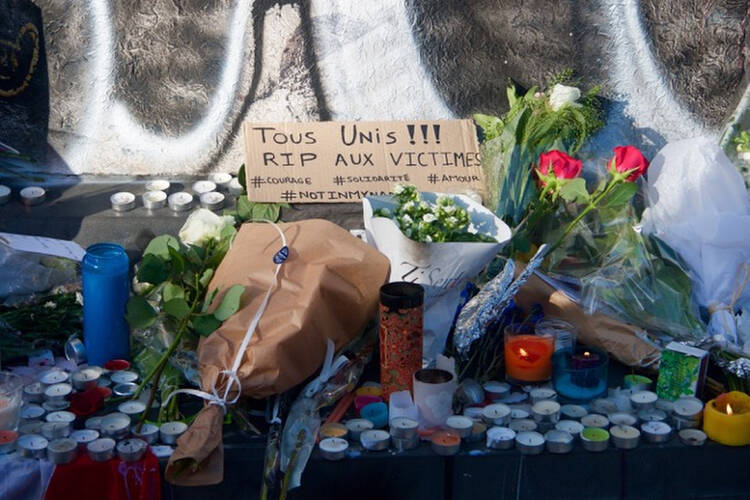In calmer times, it’s easy to dismiss complaints that election season in the United States seems to begin earlier and earlier each time, to the point that we really have a permanent campaign with no windows of opportunity for bipartisanship. Political maneuvering really does take place all the time, even in attendees’ decisions on when to applaud during an inauguration speech, so why pretend otherwise?
Still, the responses to the terrorist attacks in Paris last Friday may provoke nostalgia for the days when politicians paused a bit before trying to gain advantage from an international crisis. Perhaps it’s because the attacks did not take place on American soil (though ISIS could not send a clearer message that it is contemplating such attacks), but we certainly have not seen the “rally around the president” reactions that followed, say, the Iranian hostage crisis of 1979 or the attacks of Sept. 11, 2001.
We now have yet another red-vs.-blue map to keep track of. A cascade of states, so far all with Republican governors (Alabama, Arkansas, Illinois, Indiana, Louisiana, Massachusetts, Michigan, Misssissippi, Ohio, and Texas) have announced that they will refuse to accept refugees from war-ravaged Syria, at least until the Department of Homeland Security toughens screening measures. Louisiana Governor Bobby Jindal, currently running for president, said the introduction of Syrian refugees into the U.S. without “proper prior screening and follow-up monitoring could result in a threat to the citizens and property of this state.” (Update: Officials at refugee resettlement agencies tell the Washington Post that state governments cannot build real or metaphorical walls in this case, with one saying, “There is a close collaboration with governors and mayors and community leaders about the capacity of the area for refugees and where they can go, but once they have legal status, you cannot impede their transit between different states.”)
Other Republican candidates have suggested changing American policy to give priority to Christians refugees (as Jeb Bush said on Monday) or to stop admitting Syrian refugees entirely. (Donald Trump, still leading in the polls, called the refugees a “Trojan horse” for terrorism.) On Capitol Hill, Republican Senator Charles Grassley wants to prevent the Obama administration from spending any money to admit Syrian refugees, echoing the many fights over the limits of presidential power that have pitted the White House against the Republican Congress on health care, the environment and, perhaps most contentiously, immigration.
President Obama has so far insisted that the U.S. has a duty to take in refugees, saying, “We don’t have religious tests to our compassion,” and, “[t]he people who are fleeing Syria are the most harmed by terrorism; they are the most vulnerable as a consequence of civil war and strife.”
The Atlantic’s Conor Friedersdorf reminds us that after Sept. 11, President George W. Bush asked Americans not to blame all Muslims for the attack and denounced anti-Muslim rhetoric, and polling data suggests that he helped to stave off any backlash. (One statement from President Bush: “Those who feel like they can intimidate our fellow citizens to take out their anger don’t represent the best of America, they represent the worst of humankind, and they should be ashamed of that kind of behavior.”) Of course, the attacks of Sept. 11, 2001, did not take place between presidential debates where candidates tried to outdo each other in denouncing the current occupant of the Oval Office. There’s little hope that the president could similarly calm the waters this time. And it’s not as if Republican House Speaker Paul Ryan could get his fellow Republicans to tone things down, even if he were inclined to try.
Some of the most divisive rhetoric has come from Senator Ted Cruz, who has some momentum in the race for the Republican nomination; he may benefit from being able to make the most extreme statements in an authoritative manner (unlike Donald Trump and Ben Carson, who still sound as if they’re just winging it when they talk about foreign policy…or anything). After the Paris attacks, Mr. Cruz said on Fox News, “I recognize that Barack Obama does not wish to defend this country.” Mr. Cruz also seemed to suggest that President Obama is not bloodthirsty enough, saying on his website, “Radical Islamism…will not be deterred by targeted airstrikes with zero tolerance for civilian casualties, when the terrorists have such utter disregard for innocent life.”
There is no obvious answer on how to “defend this country.” Turning back Syrian refugees would only exacerbate fear and panic in that country, which would seem to play into ISIS’s hands. It is easy to say the U.S. “should declare war” against terrorists, as Jeb Bush has, when the current administration would take the blame for any American casualties (military or civilian, abroad or at home). There is also the danger that the Obama administration—and Hillary Clinton, should she succeed Mr. Obama—will overcompensate for being tarred as “soft on terrorism.” Washington Post columnist E.J. Dionne, referring to such absurdities as Mr. Trump criticizing French gun-control laws, writes, “The 2016 presidential campaign has been peculiarly disconnected from the real world of problems, crises, and governing.” It’s hard to imagine that the events in Paris will restore the connection.








